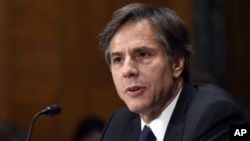U.S. is ratcheting up diplomacy with participants in the six-party talks for a strong and united response to the recent nuclear test by North Korea.
Secretary of State John Kerry will be visiting Asia “in the near future,” State Department spokesperson John Kirby said on Thursday.
Kirby said the administration supports tougher pressure against North Korea, referring to a legislation passed by the House of Representatives on strong sanctions to deny Pyongyang the hard currency it needs for nuclear program.
“We share Congress’s concerns about North Korea’s continuing violation of its commitment and international obligations, and we look forward to continue to work with Congress on our shared goal of enhancing sanctions pressure to steel North Korea towards better choices,” he said.
DPRK: 'greatest source of instability'
Meanwhile, Deputy Secretary of the State Tony Blinken is set to arrive in Japan, South Korea, and China in coming days to discuss regional security issues, including the United States' “rock-solid commitment” to its allies’ security in the face of recent North Korea provocations.
In response to VOA’s question via Twitter prior to his trip, Blinken said that U.S. and China share the same interest in regional stability, while the DPRK (Democratic People's Republic of Korea), another name for North Korea, is "the greatest source of instability" in the region.
This is the Blinken’s third visit to Northeast Asia in the last 11 months since he assumed office.
Getting China on board
While Washington is seeking tougher sanctions against Pyongyang through the United Nations Security Council, the severity of the sanctions will depend on the level of political will in Russia and China, which have veto power and are close to the isolated regime in Pyongyang.
On Wednesday, during a phone conversation between President Obama and Russian President Vladimir Putin, U.S. sought a strong and united international response to North Korea’s nuclear test, which was in defiance of Security Council resolutions, said the White House in a statement.
Seeking China’s cooperation in response to North Korea’s recent nuclear test is one of the top foreign policy priorities in 2016, said Ben Rhodes, Deputy White House National Security Advisor for Strategic Communications.
“We'll be working with China through the U.N. Security Council and also in our own bilateral discussions about how to demonstrate to North Korea that that is a path that leads to greater cost, consequences and isolation,” said Rhodes Wednesday at the Foreign Press Center.
Rhodes added Washington’s coordination with Tokyo and Seoul was “absolutely central,” noting Japanese Prime Minister Shinzo Abe and South Korea President Park Geun-Hye are among the first leaders that President Obama called after Pyongyang claimed it had successfully detonated a hydrogen bomb test last week.
U.N. Secretary General Ban Ki-moon called Pyongyang’s recent nuclear test “a destabilizing act that violates Security Council resolutions and imperils collective security,” warning of the dangers of nuclearized Korean Peninsula, on Thursday during remarks on his priorities in 2016.
Launched in 2003, the six party talks are aimed at ending North Korea's nuclear program through negotiations involving China, the United States, North and South Korea, Japan, and Russia.












